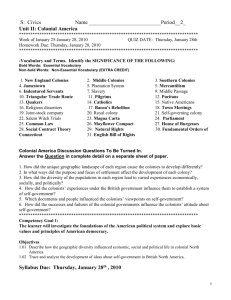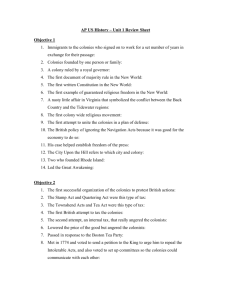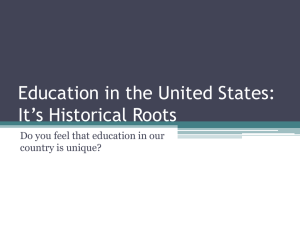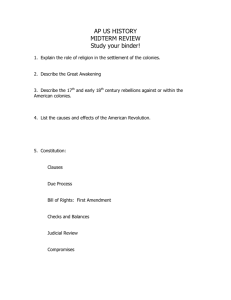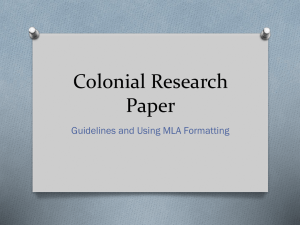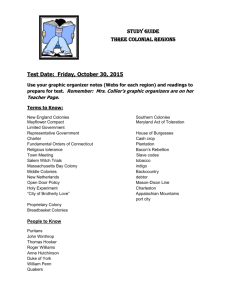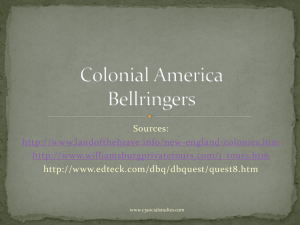Unit 1 Throwback Thursday
advertisement
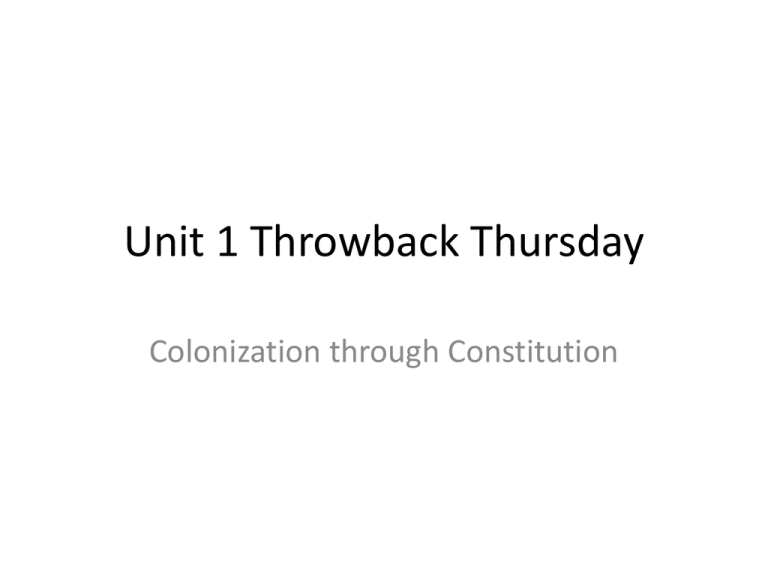
Unit 1 Throwback Thursday Colonization through Constitution • Which statement BEST explains the growth of representative government in Massachusetts Bay Colony? • a. • The Puritans wanted to establish order within their societies. • c. • Religious tolerance depended on the growth of elected legislatures • b. • England encouraged self-rule among the colonies • d. • Each newly chartered colony patterned itself on other colonies. • a. • The Puritans wanted to establish order within their societies. • What did the Mayflower Compact establish? • the possibility of self-government • What was the House of Burgesses? • an elected governing body in Virginia • Which phrase BEST describes the American colonies? • a. • religious purpose • c. • successful from the start • b. • peace and stability • d. • social equality • a. • religious purpose • • • • • • • • • Which phrase BEST describes the 13 colonies? a. socially and politically alike c. politically and economically diverse b. relatively similar geographically d. economically independent of Britain • c. • politically and economically diverse • What was the purpose of the Navigation Acts? • b. • to control the trans-Atlantic trade • What effect did the 1808 ban on the Atlantic slave trade have on slavery in America? • c. • It had little effect • • • • • • • • • What was part of the Enlightenment? a. government as a social contract c. a distrust of science b. restrictions on freedom d. religious equality • a. • government as a social contract • How did the colonists respond to the Townshend Acts? • c. • They boycotted English goods as a way to protest the taxes • What did “no taxation without representation” mean to the colonists? • d. • The colonies should not be taxed without representation in Parliament. • What followed the Boston Tea Party? • harsh restrictions on colonial liberties and trade • How did the First Continental Congress respond to the Coercive Acts? • Of what significance were the Battles of Lexington and Concord? • They were the first battles in America’s fight for independence. • William Franklin, the royal governor of New Jersey, was a loyalist. His father, Benjamin Franklin, signed the Declaration of Independence. What does this example indicate about colonial sentiment? • The cause of liberty resulted in great division among the colonists. • How did the Treaty of Paris of 1783 change the political map iof North America? • The United States claimed land that had been under British control • Of what importantce were men such as the Marquis de Lafayette and Baron von Steuben to the American cause? • they provided expertise • James Madison commented that, “A government composed of such extensive powers should be well organized and balanced.” Which of the following helped to balance power between the large and small states? • a. • the slave trade • c. • the three-fifths compromise • b. • the Great Compromise • d. • the Bill of Rights • b. • the Great Compromise • What contributed to the demise of the Articles of Confederation? • the inability of Congress to regulate the economy • Why did the Framers believe freedom of the press to be an essential right? • It helps to balance the power of government • What was added to the Constitution in order to ensure its ratification? • Bill of Rights • • • • • • • • • • • • • • Use the information to answer the question -Plymouth -Massachusetts -Pennsylvania The above are all examples of colonies a. whose primary business was plantation farming c. each formed by a single religious group b. that signed the Mayflower Compact d. formed for mostly economic reasons • c. • each formed by a single religious group • Which phrase from the Declaration of Independence does not show the influence of the Enlightenment on the thoughts of Thomas Jefferson and others? • a. • “Governments are instituted among Men, deriving their just powers from the consent of the governed....” • c. • “we mutually pledge to each other our lives...” • b. • “for the people to dissolve the political bands that have connected them...” • d. • “He has obstructed the Administration of Justice...” • d. • “He has obstructed the Administration of Justice...” • Why did colonists participate in the Boston Tea Party? • They used the opportunity to protest Britain’s control over the colonies • All of the following descriptions provide examples of triangular trade EXCEPT • a. • the Dutch settling in Japan • c. • European merchants bringing manufactured goods to trade for Africans • b. • Africans being transported on ships to the Americas • d. • tobacco and otehr products being transported to Europe • a. • the Dutch settling in Japan • Which of these was a major domestic problem faced by the government under the Articles of Confederation? • a. • maintaining national security • c. • regulating the slave trade • b. • counting population for voting purposes • d. • establishing strong state governments • a. • maintaining national security • The United State Constitution begins with the word, “We the People.” Why did Madison choose these three words to open the document? • to show that government gets its power form the “consent of the governed” • • • • • • • Which does NOT describe Jamestown? a. Its colonial government held the Salem Witch Trials c. The colony was named after the king of England b. In this colony, John Rolfe developed a tobacco cash crop. • d. • It was the first permanent Engilsh colony • a. • Its colonial government held the Salem Witch Trials • Why was the Battle of Saratoga an important turning point in the American Revolution? • It motivated the French to offer military support and financial assistance • What did the Whiskey Rebellion show about George Washington? • He was a strong president who was willing to use federal troops when needed • Common Sense was a colonial bestseller. Within 3 months of its publication, it sold 120,000 copies. In what way was use of the press critically important to America’s fight for independence? It provided the opportunity for many people to understand the issues • What did the United States gain as a result of the Treaty of Paris of 1783? • land west to the Mississippi River • In what year was Jamestown founded? • 1607 • The 3/5 compromise sought to prevent • a. • states with high slave populations from dominating the House of Representatives • c. • the Constitution from ultimately being ratified • b. • the Senate from becoming too powerful within the bicameral system • d. • Antifederalists from winning the debate over federalism • a. • states with high slave populations from dominating the House of Representatives • Use the information below to answer the question • “That whenever any form of government becomes destructive of these ends, it is the Right of the People to alter or abolish it.” • These words from the Declaration of Independence describe the enlightened idea of a • a. • need to ensure a representative government • c. • social contract between the government and the people • b. • return to a society that has no central authority • d. • revolutionary intent to overthrow the current government • • • c. • social contract between the government and the people • Use the information below to answer the question • In a letter to James Madison written in 1787, Thomas Jefferson said, “A bill of rights is what the people are entitled to against every government on earth, general or particular; and what no just government should refuse, or rest on inferences.” • Jefferson believed a bill of rights was needed to protect • a. • the right of taxation • c. • the rights of the majority • b. • the unalienable rights of citizens • d. • federal rights over states’ rights • b. • the unalienable rights of citizens Study the illustration of Jamestown’s beginnings. What details in the woodcut give an indication of the challenged faced by settlers? What information is being compared in this table? What change is shown by the table? Given the information on the table, why do you think Great Britain wanted to control colonial trade? • What were two challenges the Patriots faced when fighting for independence? • How did the U.S. Constitution establish a more balanced government?


